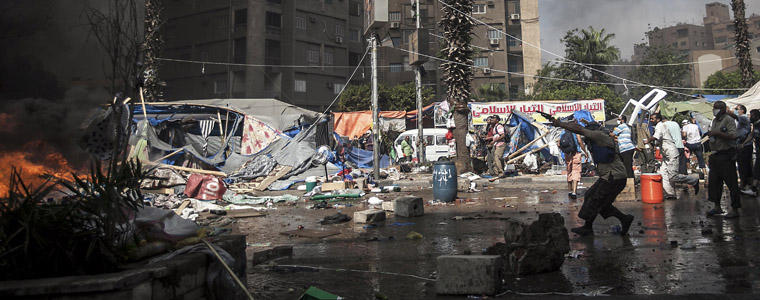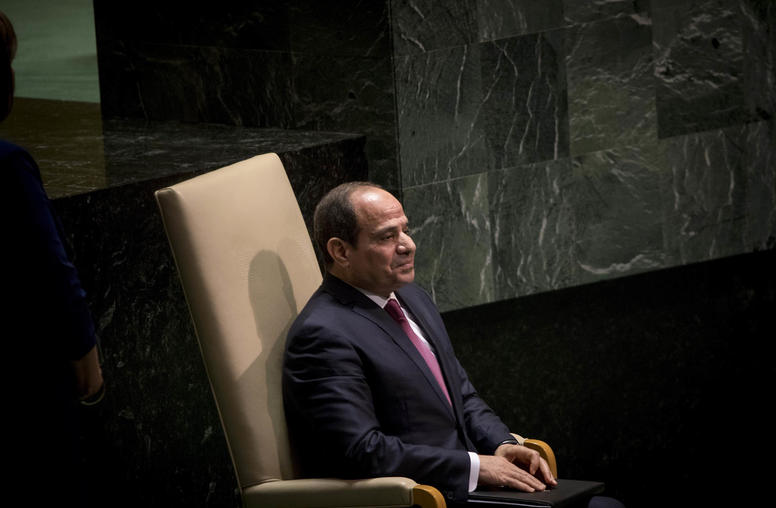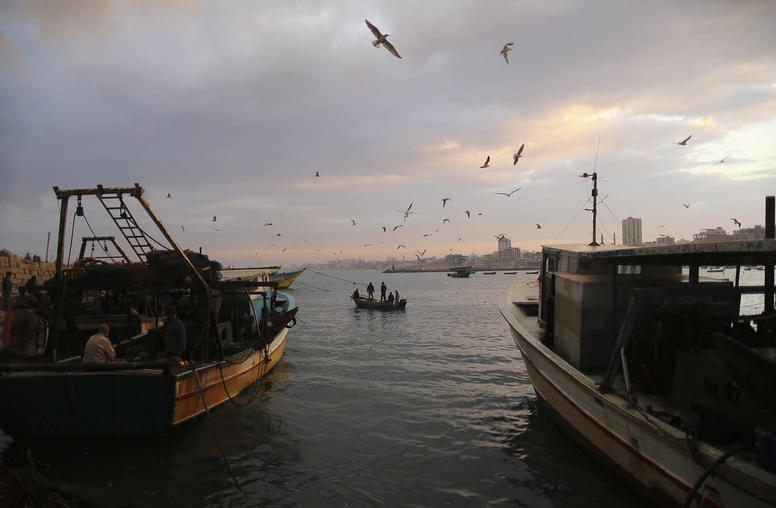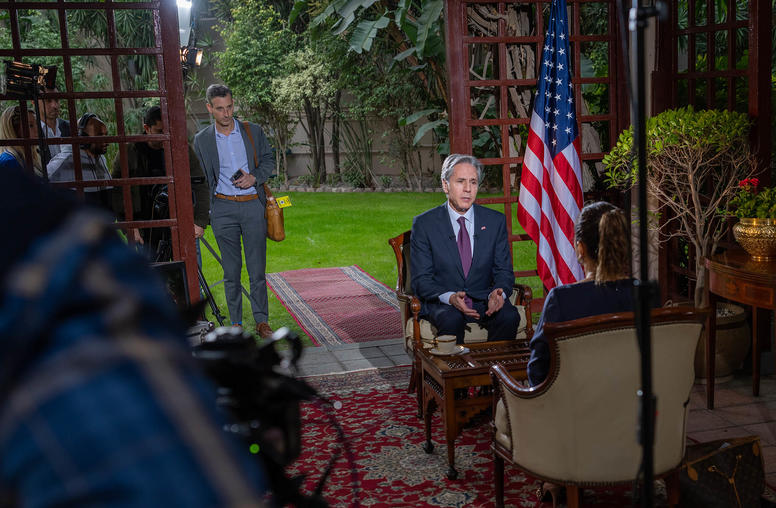Egypt’s Political Chasm Reflects Miscalculation of Public Support
The standoff in Egypt that resulted in yesterday’s lethal crackdown by the military on Muslim Brotherhood protestors may reflect a dangerous miscalculation by leaders on both sides about how much public support they have and how long they can keep it, said U.S. Institute of Peace expert Manal Omar.

Omar, the director of the Institute’s Iran, Iraq and North Africa programs, just returned from a two week trip to Egypt, meeting with leaders and citizens on both sides of the widening political chasm. In addition to Cairo, she traveled to Alexandria and met with USIP partners from Upper Egypt, including Coptic community leaders.
Throughout the visit, she repeatedly heard outdated thinking, with leaders drawing on what they saw as lessons from the aftermath of the 1952 Egyptian military coup. They seemed not to recognize that the vast majority of today’s young demonstrators and the public at large have moved past symbolic actions and want concrete political, social and economic advances.
While the majority of Egyptians seem to have calculated that supporting the military – and even a degree of violence – was the only option after the deeply unpopular one-year rule of President Mohamed Morsi, such backing may not survive extended periods of bloodshed and continuing economic deprivation, Omar told reporters at USIP yesterday.
“If the military is successful in moving the crowds out of the squares quickly, even if there is a death count, I think Egyptians are eager to move forward,” she said. “If this is pulled out further, then I could easily see where you might have more issues … The days of the military moving without being held accountable are over.”
More than 500 people have died throughout Egypt since security forces yesterday began their operation to dislodge two Cairo sit-ins by backers of Morsi. The former Muslim Brotherhood official had been voted into office in June 2012, only to be ousted by the military on July 3 this year after officers led by Egyptian General Abdul Fattah el-Sisi concluded that Morsi would refuse to step down despite widespread discontent with his increasingly authoritarian rule.
Mohamed ElBaradei, a Nobel Prize-winning former diplomat who had agreed to serve as interim vice president under the new military regime, quit yesterday in protest of the bloody crackdown on Morsi supporters.
The military and the Muslim Brotherhood “are working with Egypt in an old context, and that is leading to severe miscalculations,” Omar said. “Egypt really is a new place” since the demonstrations that started on Jan. 25, 2011, and ended three decades of dictatorship under President Hosni Mubarak that year.
People “want to see the situation in Egypt improve,” she said. “The ideological debate is not [gaining] traction the way it once would have taken traction. People are actually looking at who can deliver services, who can put Egypt on the right track.”
The military is unlikely to be able to quell the Muslim Brotherhood as it had for 30 years under Mubarak. Conversely, the Muslim Brotherhood doesn’t have the strong hierarchy that it did in the 1950s and can’t really bank on winning public sympathy with martyrdom, as it had in the past, Omar said. While Egyptians want protections for the practice of Islam, they seem to oppose a strong role for political Islam, she said.
The Brotherhood also is no longer a single bloc. Rather, it has internal divides, including a second tier of leadership and a younger circle of activists.
The military could address some of the public frustration with its return to power by pursuing an inclusive process to revise the constitution and providing incentives for the Muslim Brotherhood to participate, Omar said. Muslim Brotherhood leaders who mounted more than a month of sit-ins at two squares in Cairo have rejected any option short of Morsi’s return to office.
Even the younger revolutionaries of the mammoth June 30 protests demanding Morsi step down diverge in their views from the youth who sparked the revolt of 2011 against Mubarak, Omar said. Many of those who led the 2011 demonstrations in Tahrir Square are urging restraint on the part of the military, while the newer revolutionaries are backing the armed forces.
One promising development might be the so-called “Third Square” movement, a mainly youth-led online community of Egyptians who are rejecting both sides and seeking a “third choice,” Omar said. Some older political leaders are joining the effort.
Egyptians with whom Omar met were conflicted as to how they want the U.S. involved. While many criticized pressure, mixed messages and “interference” by outsiders, including the European Union and Gulf states, some also called for the U.S. to push the other side in a certain direction.
Egyptians not fully versed on the American government’s separation of powers have been confused by seemingly conflicting statements from members of Congress and the administration, and want to see more consistency, Omar said. They also asked for time and trust that Egyptians have the ability to work out most of their problems themselves.
Political leaders on both sides told Omar they want U.S. diplomats posted in Egypt who are seasoned but don’t come with preconceived notions based on experience elsewhere. They want the U.S. to allow them to shape American perceptions and decisions on Egypt, she said.
U.S. Secretary of State John Kerry yesterday and President Barack Obama today “strongly” condemned the security crackdown, which also included a declaration of a one-month state of emergency, again hearkening to the Mubarak era of martial law.
“It’s a serious blow to reconciliation and the Egyptian’s people’s hopes for a transition towards democracy and inclusion,” Secretary of State John Kerry said. “In the past week, at every occasion, perhaps even more than the past week, we and others have urged the government to respect the rights of free assembly and of free expression, and we have also urged all parties to resolve this impasse peacefully and underscored that demonstrators should avoid violence and incitement.”
Obama today canceled a planned joint U.S.-Egypt military exercise scheduled for September, citing the “more dangerous path taken, through arbitrary arrests, a broad crackdown on Mr. Morsi's associations and supporters and now, tragically, violence that's taken the lives of hundreds of people and wounded thousands more.”
He also called for lifting the state of emergency and said the U.S. will assess what further action it should take, he said. The U.S. provides Egypt with about $1.5 billion in aid annually, most of it for military equipment and training.
“We are guided by our national interest in this long-standing relationship,” Obama said in a statement to reporters. “But our partnership must also advance the principles that we believe in and that so many Egyptians have sacrificed for these last several years, no matter what party or faction they belong to.”



